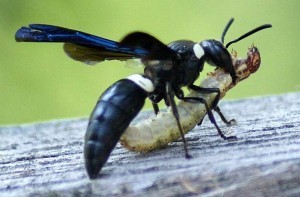Verbal Venom: Biological Parallels for Western Pathologies

- - -
Tobias Langdon
Stung Out to Die
Here’s a short and very old word: Wasp. Here’s a long and very new word: Neuroparasitology. Despite their differences, the two words go together very well. Neuroparasitology is the study of how parasites manipulate the brains of their hosts. Parasitic wasps are experts at this manipulation. For example, some inject paralysing toxins with their stings and create living larders for their offspring. Mason wasps lay eggs on paralysed caterpillars, then seal them into brood-chambers made of mud. The caterpillars are then eaten alive by the larvae that hatch from the eggs.
Parasitic wasps induce this suicidal passivity with minute injections of neurotoxin, because tiny amounts of chemical can have huge effects on nervous systems. The way a caterpillar submits to being eaten alive is both grotesque and fascinating, but then parasitism is one of the most interesting aspects of biology. Like predators, parasites have spontaneously evolved again and again in the animal kingdom. There are parasitic mammals, birds, fish, insects and more: Think of vampire-bats, cuckoos, lampreys, mosquitoes and so on.
Each species of parasite exploits some particular aspect of its host’s biology. Wasps inject toxins that paralyse nerves; cuckoos lay camouflaged eggs that fool eyes and brains. But this raises a dangerous idea about Homo sapiens. It’s clear from biology that predation and parasitism evolve quickly and easily among animals. All birds have a common ancestor, but some birds, like eagles and shrikes, now prey on their relatives, while others, like cuckoos and skuas, now parasitize their relatives. So why can’t predation and parasitism have evolved among those animals known as human beings? Why can’t there be predatory or parasitic ideologies, professions and even races?
Catch-Twenty-’Koo
One answer might be this: there can’t be because that’s a wicked thing to suggest – it’s bigoted, hateful and racist. But that answer might, in itself, be evidence for the proposition. If parasitism does exist among human beings, it will exploit some particular aspect of our biology. Wasps can easily inject chemicals into the brains of other insects. Human beings can easily inject ideas into the brains of other human beings. They do this using something called language. . . .
One answer might be this: there can’t be because that’s a wicked thing to suggest – it’s bigoted, hateful and racist. But that answer might, in itself, be evidence for the proposition. If parasitism does exist among human beings, it will exploit some particular aspect of our biology. Wasps can easily inject chemicals into the brains of other insects. Human beings can easily inject ideas into the brains of other human beings. They do this using something called language. . . .



